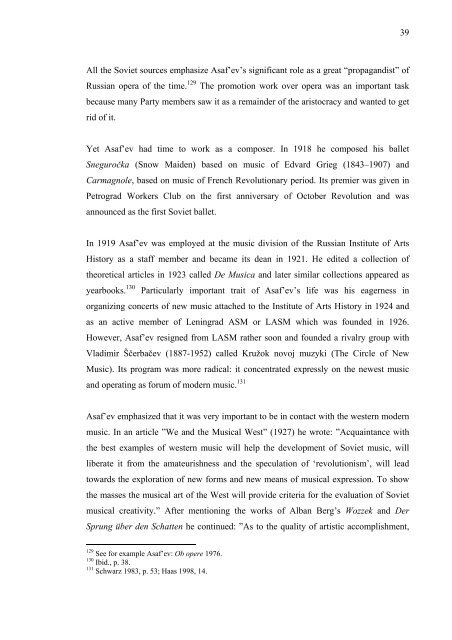Boris Asaf'ev and the Soviet Musicology - E-thesis
Boris Asaf'ev and the Soviet Musicology - E-thesis
Boris Asaf'ev and the Soviet Musicology - E-thesis
Create successful ePaper yourself
Turn your PDF publications into a flip-book with our unique Google optimized e-Paper software.
All <strong>the</strong> <strong>Soviet</strong> sources emphasize Asaf’ev’s significant role as a great “propag<strong>and</strong>ist” of<br />
Russian opera of <strong>the</strong> time. 129 The promotion work over opera was an important task<br />
because many Party members saw it as a remainder of <strong>the</strong> aristocracy <strong>and</strong> wanted to get<br />
rid of it.<br />
Yet Asaf’ev had time to work as a composer. In 1918 he composed his ballet<br />
Sneguročka (Snow Maiden) based on music of Edvard Grieg (1843–1907) <strong>and</strong><br />
Carmagnole, based on music of French Revolutionary period. Its premier was given in<br />
Petrograd Workers Club on <strong>the</strong> first anniversary of October Revolution <strong>and</strong> was<br />
announced as <strong>the</strong> first <strong>Soviet</strong> ballet.<br />
In 1919 Asaf’ev was employed at <strong>the</strong> music division of <strong>the</strong> Russian Institute of Arts<br />
History as a staff member <strong>and</strong> became its dean in 1921. He edited a collection of<br />
<strong>the</strong>oretical articles in 1923 called De Musica <strong>and</strong> later similar collections appeared as<br />
yearbooks. 130 Particularly important trait of Asaf’ev’s life was his eagerness in<br />
organizing concerts of new music attached to <strong>the</strong> Institute of Arts History in 1924 <strong>and</strong><br />
as an active member of Leningrad ASM or LASM which was founded in 1926.<br />
However, Asaf’ev resigned from LASM ra<strong>the</strong>r soon <strong>and</strong> founded a rivalry group with<br />
Vladimir Ščerbačev (1887-1952) called Kružok novoj muzyki (The Circle of New<br />
Music). Its program was more radical: it concentrated expressly on <strong>the</strong> newest music<br />
<strong>and</strong> operating as forum of modern music. 131<br />
Asaf’ev emphasized that it was very important to be in contact with <strong>the</strong> western modern<br />
music. In an article ”We <strong>and</strong> <strong>the</strong> Musical West” (1927) he wrote: ”Acquaintance with<br />
<strong>the</strong> best examples of western music will help <strong>the</strong> development of <strong>Soviet</strong> music, will<br />
liberate it from <strong>the</strong> amateurishness <strong>and</strong> <strong>the</strong> speculation of ‘revolutionism’, will lead<br />
towards <strong>the</strong> exploration of new forms <strong>and</strong> new means of musical expression. To show<br />
<strong>the</strong> masses <strong>the</strong> musical art of <strong>the</strong> West will provide criteria for <strong>the</strong> evaluation of <strong>Soviet</strong><br />
musical creativity.” After mentioning <strong>the</strong> works of Alban Berg’s Wozzek <strong>and</strong> Der<br />
Sprung über den Schatten he continued: ”As to <strong>the</strong> quality of artistic accomplishment,<br />
129<br />
See for example Asaf’ev: Ob opere 1976.<br />
130<br />
Ibid., p. 38.<br />
131<br />
Schwarz 1983, p. 53; Haas 1998, 14.<br />
39

















